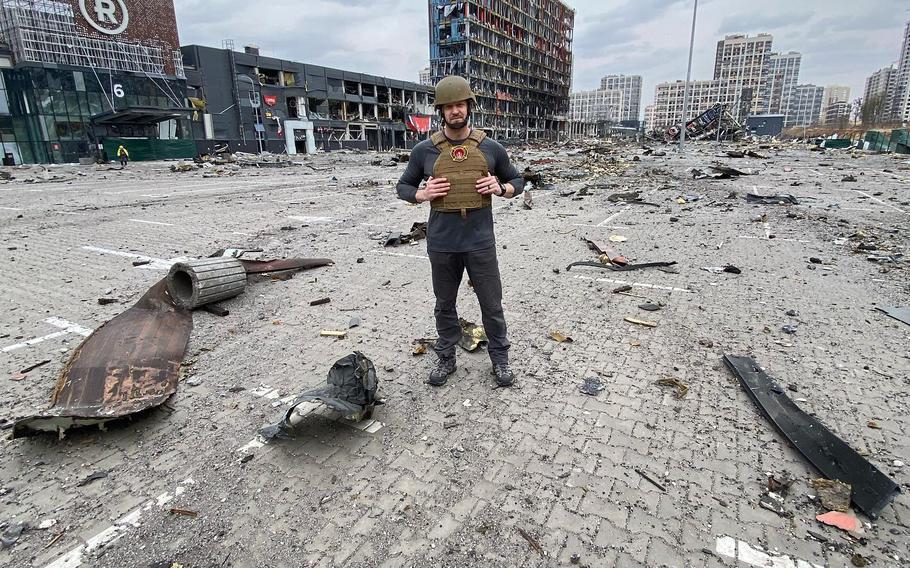
On March 22, Idaho Marine veteran Jared Malone came to Ukraine to raise money for Victory Christian Church and help rent a building in Lviv that could house refugees. He spent nearly a month in Ukraine, flying back to the U.S. on April 16. (Facebook)
WARSAW, Poland (Tribune News Service) — On March 28, as bombs fell on the then-besieged city of Kyiv, Jared Malone was livid and confused.
The Marine veteran turned counselor who lives in Post Falls had been talking with a family behind Russian lines near the suburb of Irpin. The family, whose daughter was sick, asked Malone and his two Ukrainian friends for help getting to the safety of western Ukraine, where Malone had been raising money and volunteering at a church. All day, Malone listened to the rumble of bombs and artillery. Reports bubbled up online that the Russians were making a move to fully surround Kyiv, cutting off Malone's southern escape route.
The three men debated what to do. Should they go and rescue the family? Should they return to the safety of western Ukraine? Malone had served two combat tours in Iraq and had the skills and experience to go into enemy territory, but should he?
"I am not here to fight a war but to help in a humanitarian capacity. I am not seeking out an enemy but rather trying my best to avoid this one. As I feel them getting closer, I have to remind myself why I am here and what my role is," he texted from Kyiv that evening. "Drawing a line of when I must leave is proving to be a problem as I am struggling to leave behind those who need help. Unfortunately, that window is closing for us right now. Phones are starting to drop calls and getting hard to connect. I don't think we can do anything more today. It breaks my heart."
Malone and his friends decided to not go get the family. That evening, he lay in bed, the anger and frustration from the decision thwarting sleep. At the same time, being back in a war zone had triggered Malone's own memories of combat and the resulting PTSD. Staring at the ceiling, he wondered, why am I doing this to myself?
And then, around 2 a.m., his Ukrainian friend rushed into the room. Two families had just arrived from Mariupol. With them was a 2-month-old girl. Malone, who has twin daughters, scooped the child up and held her for hours while the kid's exhausted parents ate and rested after a harrowing flight.
And there lay the answer to Malone's question.
"I remember saying to myself, 'This girl right here is worth a lifetime of PTSD,' " he said. "It's worth 1,000 years of personal trauma. I never experienced anything like that when I was in the military."
Malone never heard again from the family behind Russian lines, a fact that still eats at him. But the experience holding the infant from Mariupol gave him some solace and completed a personal journey. In 2005, while on the Iraq border, Malone, who was a Marine tank crewman, got in a firefight with insurgents. During the battle, the combatants inadvertently killed civilians, including children.
That trauma and guilt, among other combat experiences, ate at Malone, and he struggled, like many soldiers, to reintegrate into civilian life. The VA estimates that between 11% and 20% of all veterans of the Iraq and Afghanistan conflicts suffer from PTSD.
Malone certainly did. He had nightmares. He was angry, and it was threatening his nascent relationship with his now-wife. So he started going to counseling through Veterans Affairs and then went back to school.
Now, Malone is a licensed master social worker with a bachelor's degree in psychology from the University of Hawaii and a master's from Fordham University.
On March 22, he came to Ukraine to raise money for Victory Christian Church and help rent a building in Lviv that could house refugees. He'd just graduated from school and believed his combination of experiences — combat and counseling — could be helpful. He spent nearly a month in Ukraine, flying back to the U.S. on April 16.
During that time, he helped raise more than $100,000 for the Victory Christian Church. Some of that money went to renting a large building the church is using as a shelter and a kitchen for refugees. Excess money is being sent to churches and organizations in some of the hardest hit areas, including Bucha and Mariupol.
And on April 9, Malone gave a talk to at the Victory Christian Church in Lviv about trauma and how refugees and those helping refugees can spot and respond to it. About 70 people attended his talk, and another 100 watched online. He talked about the signs of trauma and taught breathing techniques, and how to listen and respond appropriately to a traumatized person. He also emphasized that nearly everyone present was suffering from some sort of trauma themselves, either having fled their own homes or having relatives that did.
"The process of healing from trauma is very complex, and it can last a very long time," he said during the talk. "The process is nonlinear, and there are many steps a victim has to go through to heal."
For him, one of those nonlinear steps came the night he rocked the infant from Mariupol as her parents rested. Those few hours "made it all come full circle."
"All these bad experiences you have been through, if this is the end result, this is worth it," he said. "A thousand lifetimes worth it."
(c)2022 The Spokesman-Review (Spokane, Wash.)
Visit The Spokesman-Review (Spokane, Wash.) at www.spokesman.com
Distributed by Tribune Content Agency, LLC.